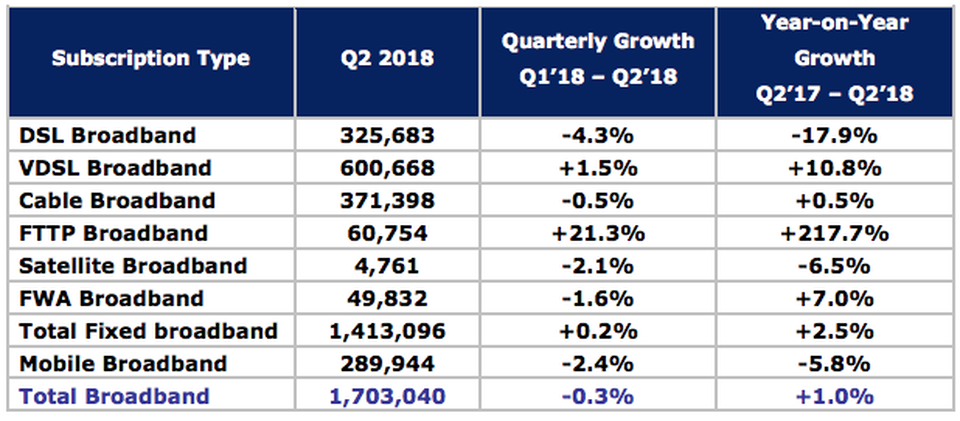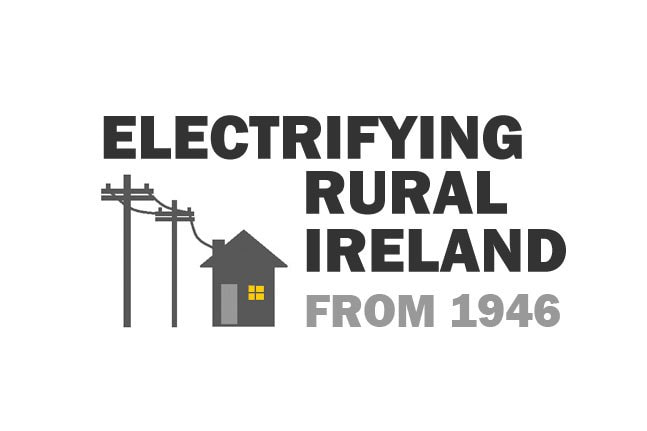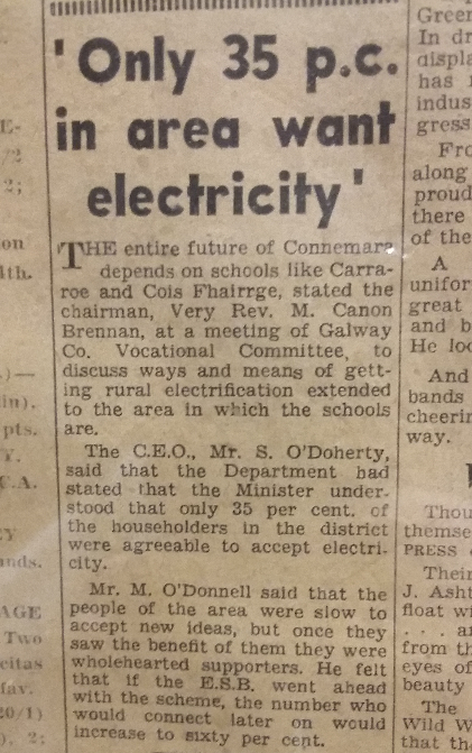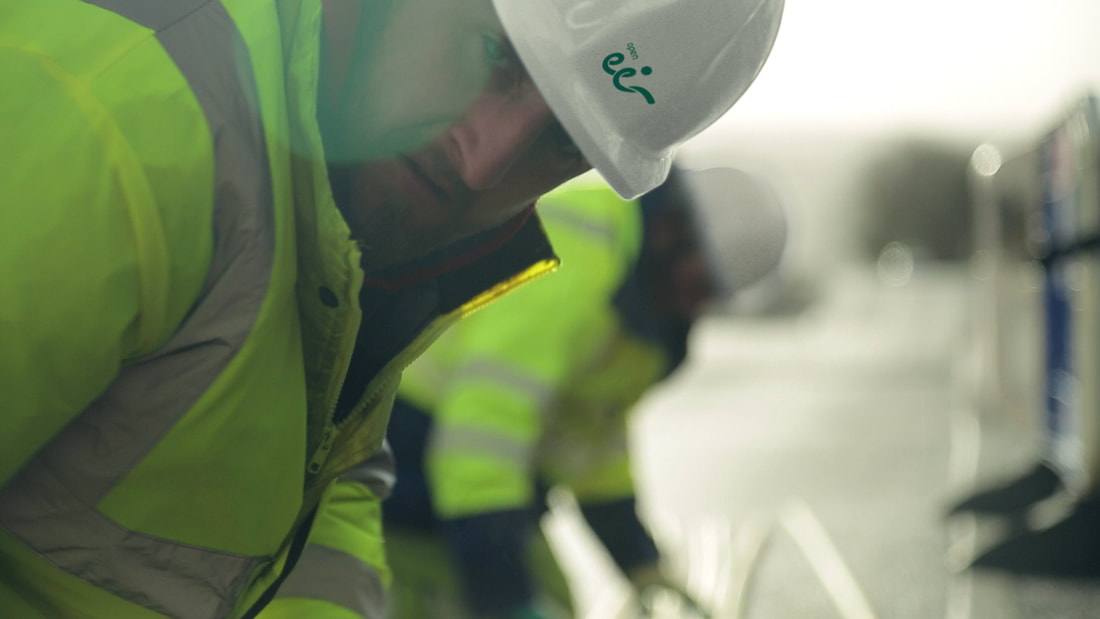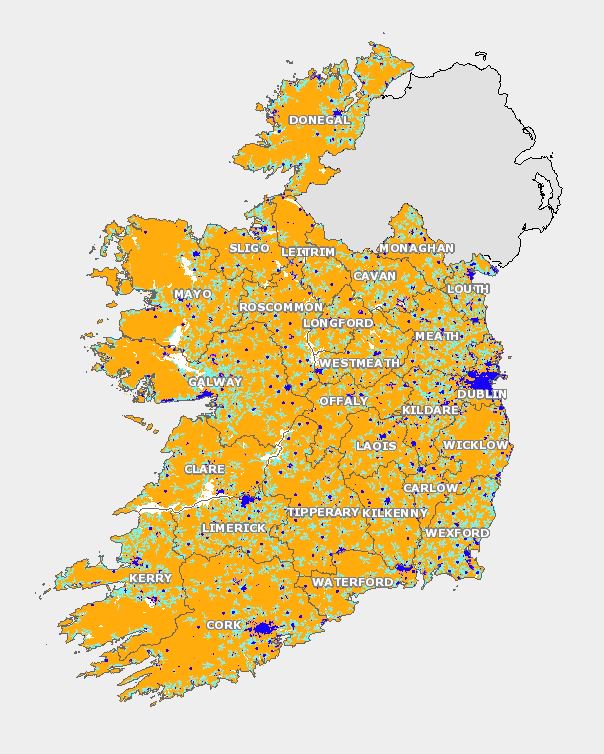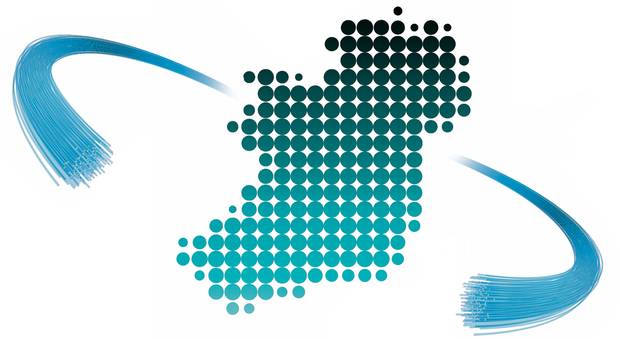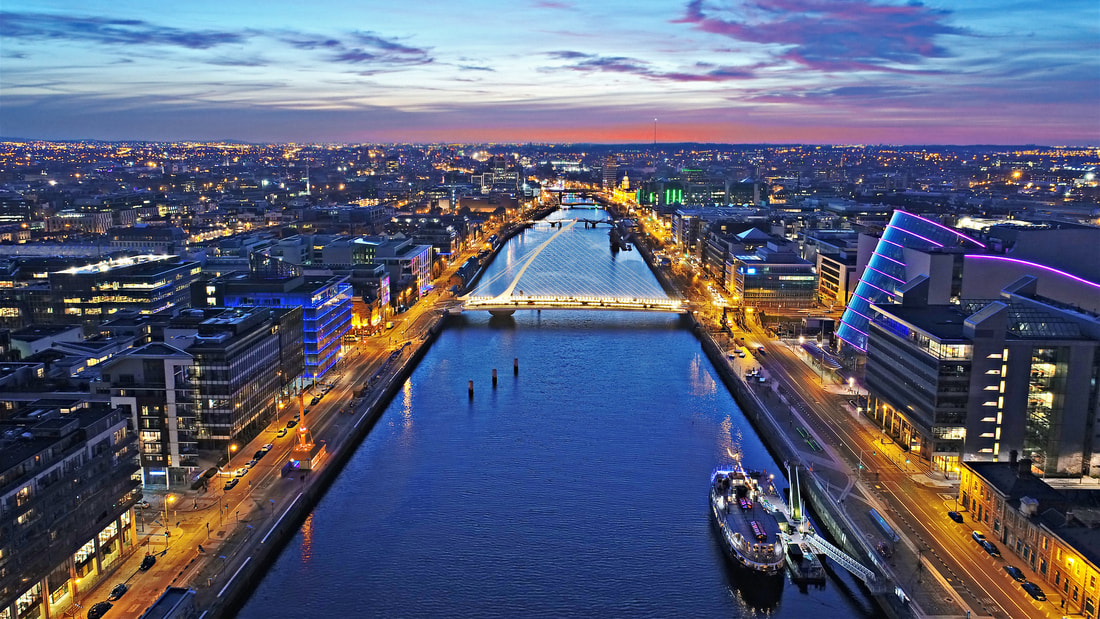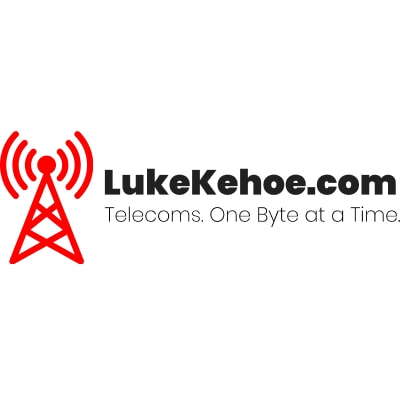Fibre Broadband: The Electricity of Tomorrow
Disputing the need for fibre is like disputing the need for electricity: it is nonsensical.
Published 12/11/18
No one, not one single person, questions the categorisation of electricity as a vital utility service. And why would we? It has been one of the most disruptive technologies ever developed by mankind, so revolutionary in fact that our planet can now be seen glistening in the Milky Way millions of light years away. Every home, business and farm in Ireland can access electricity, and when the lights go out during a storm, we panic. This technology is an integral part of our modern lives. For, without it, there would be no Internet, no iPhone or no way to cure the sick.
In the years gone by the Irish media has been awash with devastating stories from people across the country, stories about losing jobs, losing children, and losing hope because there is a chronic deprivation of broadband. There have been tears shed, villages abandoned and homes left isolated. On behalf of over one million Irish people whom may never be given the opportunity to read this very article because the State has failed them: I am horrified by the latest ill-advised trend which is beginning to trickle its way through the Irish media like a parasite out to kill.
The level of absurdity that has been written, spoke and pushed by news outlets, if I can even call them that in this scenario, is incredibly debilitating for a dream and mission which many people, including myself, share and aspire to: connecting the disconnected in Ireland. Let's get this straight, fibre broadband, in which fibre optic cabling is run all the way into your home or business, is the electricity of tomorrow, and the future of connectivity.
In the years gone by the Irish media has been awash with devastating stories from people across the country, stories about losing jobs, losing children, and losing hope because there is a chronic deprivation of broadband. There have been tears shed, villages abandoned and homes left isolated. On behalf of over one million Irish people whom may never be given the opportunity to read this very article because the State has failed them: I am horrified by the latest ill-advised trend which is beginning to trickle its way through the Irish media like a parasite out to kill.
The level of absurdity that has been written, spoke and pushed by news outlets, if I can even call them that in this scenario, is incredibly debilitating for a dream and mission which many people, including myself, share and aspire to: connecting the disconnected in Ireland. Let's get this straight, fibre broadband, in which fibre optic cabling is run all the way into your home or business, is the electricity of tomorrow, and the future of connectivity.
The Nonsense of "Poor takeup"
"Oh, look, only 15% of people who now have access to eir's FTTH network are actually availing of the service, let's slam the breaks on fibre investment and ask ourselves, is this a waste of money?".
Yes, you are probably as astounded as I am to hear the above phrase tossed around the media, not only because it directly contradicts the years of work that have been poured into the National Broadband Plan, but also because the sentiment undermines the criticality of work being carried out by companies such as eir and SIRO to reverse the stark rural/urban digital divide which plagues Ireland.
I want to put some of these statements into context by giving you the facts, and then you can be the judge of whether or not deploying fibre is a worth-while investment. Here are the facts: over 500,000 buildings in Ireland lay dark in the digital stone age, with no reliable access to the Internet, putting some 1,000,000 people which live within these dwellings in a dilemma. And that dilemma is a pretty sad one: stay at home and face losing a job due to a lack of broadband, or, pack the bags and move to a city such as Dublin where reliable broadband is now taken for granted.
This is the situation that we find ourselves in. Years of regulatory failures, misguided investments, and dare I say, fatal privatisation moves have left us fumbling. All the while, the Internet has extended its reach over societies that can access it, enriching our lives, entertaining the masses and comforting the sick.
But, if the Internet is such a transformational invention, and the need for reliable broadband is so desperate, why have just over 30,000 customers signed up to a service that has the potential to transform lives? The answer to that question is not clear-cut, and it certainly isn't along the lines of people not wanting reliable broadband, as the media and government would have you believe.
Yes, you are probably as astounded as I am to hear the above phrase tossed around the media, not only because it directly contradicts the years of work that have been poured into the National Broadband Plan, but also because the sentiment undermines the criticality of work being carried out by companies such as eir and SIRO to reverse the stark rural/urban digital divide which plagues Ireland.
I want to put some of these statements into context by giving you the facts, and then you can be the judge of whether or not deploying fibre is a worth-while investment. Here are the facts: over 500,000 buildings in Ireland lay dark in the digital stone age, with no reliable access to the Internet, putting some 1,000,000 people which live within these dwellings in a dilemma. And that dilemma is a pretty sad one: stay at home and face losing a job due to a lack of broadband, or, pack the bags and move to a city such as Dublin where reliable broadband is now taken for granted.
This is the situation that we find ourselves in. Years of regulatory failures, misguided investments, and dare I say, fatal privatisation moves have left us fumbling. All the while, the Internet has extended its reach over societies that can access it, enriching our lives, entertaining the masses and comforting the sick.
But, if the Internet is such a transformational invention, and the need for reliable broadband is so desperate, why have just over 30,000 customers signed up to a service that has the potential to transform lives? The answer to that question is not clear-cut, and it certainly isn't along the lines of people not wanting reliable broadband, as the media and government would have you believe.
Déjà Vu for Electrification
I think people forget that revolutionary technological inventions don't gather steam overnight, and that's a trend that has been replicated throughout the history of the Internet. The process of electrification has taken decades, and even still, there are some countries in the world where access to electricity is almost non-existent. But, in a country such as Ireland, I would be shocked to see a single home where the inhabitants refuse access to electricity today. That wasn't always the case, though, with the exact story about "poor take-up" of electricity rippling through the media like it is today, this time with fibre.
I could dig into the archives and surface countless articles about people resisting electrification, about people claiming the technology was just a gimmick. However, slowly but surely, as the magic of electricity found its way into the hands of more and more people, and they began to see its benefits in practice, they succumbed to the revolution. Education played a big part in helping people to understand what electricity actually was, and how it worked.
People don't like a drastic change, and they don't like to adopt a new technology if they don't understand how it works and how it will help them in their everyday lives. This is true for electricity, true for the smartphone and true now for fibre broadband. Just imagine how different the world would be today if we had allowed stories about "poor take-up" to disincentivise further investment in electricity. Now, if we fast forward a decade or so, we will be saying the same about fibre broadband.
Unfortunately, many people living in the areas where there is an absence of broadband have become accustomed to being cut off from the outside world and they know no different. The same can be said for those living in urban areas, who are now so familiar with having access to reliable broadband whenever they want that they don't realise how bad the situation actually is in rural areas. The combination of the above is what has left us questioning the importance of fibre broadband today, and it is a dangerous precedent that needs to be put to rest.
People don't like a drastic change, and they don't like to adopt a new technology if they don't understand how it works and how it will help them in their everyday lives. This is true for electricity, true for the smartphone and true now for fibre broadband. Just imagine how different the world would be today if we had allowed stories about "poor take-up" to disincentivise further investment in electricity. Now, if we fast forward a decade or so, we will be saying the same about fibre broadband.
Unfortunately, many people living in the areas where there is an absence of broadband have become accustomed to being cut off from the outside world and they know no different. The same can be said for those living in urban areas, who are now so familiar with having access to reliable broadband whenever they want that they don't realise how bad the situation actually is in rural areas. The combination of the above is what has left us questioning the importance of fibre broadband today, and it is a dangerous precedent that needs to be put to rest.
eir's Situation
In historical terms, the initial take-up of fibre broadband is not poor, in fact, it is actually in line with the adoption trends of most other technologies that came before it. Over at eir, the incumbent broadband operator in Ireland, the company has now "passed" over 200,000 premises located in rural Ireland with fibre-optic cabling. If you happen to see one of those black enclosures on a telephone pole, a splice box, near your area, eir has carried out work there as part of their plan with the government to connect over 300,000 premises with Fibre-To-The-Home (FTTH) broadband. Don't forget that this rollout is just over a year old, and eir says that they are happy with the level of take-up at such an early stage.
But there are several problems with this rollout that have not helped to boost the initial low level of adoption. For one, eir has done a shockingly poor job of actually informing people that they can access broadband speeds of up to 1000Mbps. And for those that were informed, the thought of having to splash out over €250 (once-off connection fee) for a technology that they do not understand makes no sense.
Factor in the fact that eir's wholesale division, open eir, is allowed to charge a retailer such as Sky or Vodafone an exorbitant and unfair fee to connect to the network due to ComReg's dysfunctional price regulations, and it isn't so hard to see why take-up is "poor". There are so many other reasons why more people aren't signing up, ranging from being stuck in a contract to being told that their home cannot be connected to eir's network even if their house has been "passed" with fibre. However, the key thing that I want to put across is that the reason for poor take-up is not because people don't want world-class broadband, that couldn't be further from the truth.
In my opinion, the most profound barrier to adoption is education, and I think eir, and the entire industry, need to address this urgently. Advertising both FTTC and FTTH broadband as just "fibre broadband" is a mistake, especially when one is more expensive than the other. How are ordinary consumers expected to pinpoint the difference?
Nonetheless, I can say with certainty that the number of people who adopt eir's FTTH technology will rise significantly in the coming months and years, just as it did with FTTC broadband before it. All it takes is time, and as eir "passes" more and more houses with FTTH, awareness and knowledge about the technology will grow exponentially.
But there are several problems with this rollout that have not helped to boost the initial low level of adoption. For one, eir has done a shockingly poor job of actually informing people that they can access broadband speeds of up to 1000Mbps. And for those that were informed, the thought of having to splash out over €250 (once-off connection fee) for a technology that they do not understand makes no sense.
Factor in the fact that eir's wholesale division, open eir, is allowed to charge a retailer such as Sky or Vodafone an exorbitant and unfair fee to connect to the network due to ComReg's dysfunctional price regulations, and it isn't so hard to see why take-up is "poor". There are so many other reasons why more people aren't signing up, ranging from being stuck in a contract to being told that their home cannot be connected to eir's network even if their house has been "passed" with fibre. However, the key thing that I want to put across is that the reason for poor take-up is not because people don't want world-class broadband, that couldn't be further from the truth.
In my opinion, the most profound barrier to adoption is education, and I think eir, and the entire industry, need to address this urgently. Advertising both FTTC and FTTH broadband as just "fibre broadband" is a mistake, especially when one is more expensive than the other. How are ordinary consumers expected to pinpoint the difference?
Nonetheless, I can say with certainty that the number of people who adopt eir's FTTH technology will rise significantly in the coming months and years, just as it did with FTTC broadband before it. All it takes is time, and as eir "passes" more and more houses with FTTH, awareness and knowledge about the technology will grow exponentially.
SIRO's Situation
Being a pioneer of FTTH broadband, SIRO, a joint venture between Vodafone and the ESB, finds itself in a similar position as eir does, with take-up hovering above 15%. Regardless of the take-up figures, SIRO is steaming ahead with its plans to connect homes and businesses across Ireland with "Gigabit-Class" broadband connectivity. A vital thing to remember is that SIRO's network has been powered by 100% fibre-optics since inception, and over 200,000 homes can access the technology today.
As a wholesaler, access to SIRO's network is sold by companies such as Vodafone, Digiweb and Sky, with these retailers taking responsibility for advertising and after-sales support. But the same issues have surfaced here as they have with eir. Let's take Vodafone for example, the company has stupidly thrown the "fibre broadband" stamp on both open eir's FTTC broadband and SIRO's FTTH broadband. These methods of providing broadband are radically different, and by interchanging the two, Vodafone is confusing consumers.
Now, on Vodafone's part, the company is proactively working to resolve some of the above issues. The penny has finally dropped that retailers need to call FTTH broadband by what it actually is, Gigabit Broadband, in order to separate it from other inferior options such as Virgin Media's proprietary DOCSIS 3.0 cable network. Moreover, the company is now including a new router, the Gigabox Modem, exclusive to customers that can access SIRO's network.
Many people are still unaware that SIRO's FTTH network is deployed alongside the ESB's electricity distribution network, ensuring that a high QoS is delivered and that reliability is superior to open eir's network. Again, I think it is fundamental that SIRO and its retailers work to educate people about FTTH broadband, and how they are offering a technology which leapfrogs any competition in terms of performance and longevity.
Frankly, when a news outlet questions the need for fibre broadband, they are essentially questioning the purpose of SIRO's existence. And I think that is a very bad road to go down because SIRO's efforts to revolutionise broadband connectivity in Ireland have not been funded by any government scheme like eir's efforts have. In fact, it is a long-term investment of €450 million by Vodafone and the ESB. This investment will pay off, both for SIRO and for the Irish people, it is just a question of when rather than if.
As a wholesaler, access to SIRO's network is sold by companies such as Vodafone, Digiweb and Sky, with these retailers taking responsibility for advertising and after-sales support. But the same issues have surfaced here as they have with eir. Let's take Vodafone for example, the company has stupidly thrown the "fibre broadband" stamp on both open eir's FTTC broadband and SIRO's FTTH broadband. These methods of providing broadband are radically different, and by interchanging the two, Vodafone is confusing consumers.
Now, on Vodafone's part, the company is proactively working to resolve some of the above issues. The penny has finally dropped that retailers need to call FTTH broadband by what it actually is, Gigabit Broadband, in order to separate it from other inferior options such as Virgin Media's proprietary DOCSIS 3.0 cable network. Moreover, the company is now including a new router, the Gigabox Modem, exclusive to customers that can access SIRO's network.
Many people are still unaware that SIRO's FTTH network is deployed alongside the ESB's electricity distribution network, ensuring that a high QoS is delivered and that reliability is superior to open eir's network. Again, I think it is fundamental that SIRO and its retailers work to educate people about FTTH broadband, and how they are offering a technology which leapfrogs any competition in terms of performance and longevity.
Frankly, when a news outlet questions the need for fibre broadband, they are essentially questioning the purpose of SIRO's existence. And I think that is a very bad road to go down because SIRO's efforts to revolutionise broadband connectivity in Ireland have not been funded by any government scheme like eir's efforts have. In fact, it is a long-term investment of €450 million by Vodafone and the ESB. This investment will pay off, both for SIRO and for the Irish people, it is just a question of when rather than if.
"Dump the National Broadband Plan"
The above is yet another ridiculous statement that has been brought to light, all in lieu of the "poor" take-up rates on eir's FTTH network. There is no other conceivable way to provide future-proof broadband access to over one million Irish people without state intervention. And that intervention will require the use of fibre somewhere in the network, all the way to the home or business if we want it to be a long-term investment that will be fit for purpose and be able to stand the test of time.
The same occurred with rural electrification, it is a damn expensive project, but it is something that must be done. Many people living in urban areas argue that taxpayer's money would be better spent on projects concerning the upgrading of transport facilities in cities such as Dublin. But, the pressure on our transport links or urban housing wouldn't be so great if people could access broadband in the comfort of their rural homes.
Just think about it, reliable access to broadband would allow thousands of people to work from their homes, and businesses will be encouraged to invest in these areas due to the availability of world-class connectivity. The provision of this broadband would also help to mitigate rural depopulation, an issue which has traumatised many.
Whether the National Broadband Plan will proceed in its current state or not isn't the point, the point is that we need this utility, now more than ever. Allowing concerns about "low-take up" rates to derail a project of such importance would be a disaster for our country.
The same occurred with rural electrification, it is a damn expensive project, but it is something that must be done. Many people living in urban areas argue that taxpayer's money would be better spent on projects concerning the upgrading of transport facilities in cities such as Dublin. But, the pressure on our transport links or urban housing wouldn't be so great if people could access broadband in the comfort of their rural homes.
Just think about it, reliable access to broadband would allow thousands of people to work from their homes, and businesses will be encouraged to invest in these areas due to the availability of world-class connectivity. The provision of this broadband would also help to mitigate rural depopulation, an issue which has traumatised many.
Whether the National Broadband Plan will proceed in its current state or not isn't the point, the point is that we need this utility, now more than ever. Allowing concerns about "low-take up" rates to derail a project of such importance would be a disaster for our country.
An Ireland without Fibre is an Ireland without Light
Technically speaking, fibre optic broadband allows for data transmission using different wavelengths of light and internal reflection. In many eyes, it is magic because no other connectivity solution available today can facilitate the same capacity as fibre, not 5G or 4G and definitely not copper in its current form. But fibre is much more than just faster broadband: the technology is a gateway to a new world of innovation, a gateway to a hyper-connected future and a gateway out of darkness and poverty.
Just as electricity lit up our island, fibre will do the very same, giving people the opportunity to access information at their fingertips. The communities that find themselves lacking access to fibre broadband will, undoubtedly, be at a major disadvantage in so many different ways, from struggling to attract investment to witnessing the migration of their population to urban areas.
Ireland's prospects as the tech hub of Europe lie on very thin ice if we decide to undermine the perceived importance of projects such as the National Broadband Plan and rollouts being performed by eir and SIRO. As an example of how transformational fibre broadband can be, SIRO's efforts to spur localised investment in rural regions by establishing "Gigabit Hubs" in which people can work and set up their business while connecting to world-class broadband has led to the creation of twenty-nine new start-ups.
If you take anything from this article, I want you to remember the following: fibre is the electricity of tomorrow. When we look back in a decade or so and read stories about people being resistant to adopting the technology in the early days, we will quite literally laugh, just as we do today when we look on the slow take-up of electricity. Disputing the need for fibre is like disputing the need for electricity: it is nonsensical.
Just as electricity lit up our island, fibre will do the very same, giving people the opportunity to access information at their fingertips. The communities that find themselves lacking access to fibre broadband will, undoubtedly, be at a major disadvantage in so many different ways, from struggling to attract investment to witnessing the migration of their population to urban areas.
Ireland's prospects as the tech hub of Europe lie on very thin ice if we decide to undermine the perceived importance of projects such as the National Broadband Plan and rollouts being performed by eir and SIRO. As an example of how transformational fibre broadband can be, SIRO's efforts to spur localised investment in rural regions by establishing "Gigabit Hubs" in which people can work and set up their business while connecting to world-class broadband has led to the creation of twenty-nine new start-ups.
If you take anything from this article, I want you to remember the following: fibre is the electricity of tomorrow. When we look back in a decade or so and read stories about people being resistant to adopting the technology in the early days, we will quite literally laugh, just as we do today when we look on the slow take-up of electricity. Disputing the need for fibre is like disputing the need for electricity: it is nonsensical.

